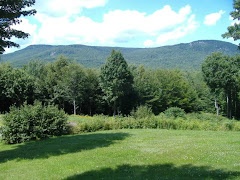
On December 18, 2009, Highland Wind LLC (HW LLC) filed a permit application with Maine’s Land Use Regulation Commission (LURC) to build a 48 turbine grid-scale wind energy facility in Highland Plantation. Due to the inappropriateness of the site and due to the negative impacts such a development would have to the local ecology and environment, to the nature-based economy, to the health and quality of life of the area residents, and to scenic qualities of the area near the Bigelow Preserve, the Appalachian Trail and the Arnold Trail, Friends of the Highland Mountains (FHM), along with the Maine Appalachian Trail Club (MATC) and others, requested intervenor status.
Upon analysis of the application, FHM filed a motion to suspend the review process until such time as HW LLC provided the necessary documentation to meet the completeness standards set forth by LURC. On April 7, 2010, LURC ruled in FHM’s favor, and the review of the permit was suspended.
On December 29, 2010, HW LLC submitted a revised permit application for a 39 turbine wind facility, acceding, in part, to the concerns about the project’s impacts to the Appalachian Trail and the Bigelow Preserve. The application was deemed complete and accepted for processing on February 23, 2011, initiating commencement of the expedited review process once more. Again, upon examining the application, FHM determined several areas wherein the applicant had not provided sufficient documentation for a comprehensive review (including complete Title, Right or Interest; make, model and size of turbines proposed for the project; and sufficient proof of financial capacity) and we once again petitioned LURC to suspend the review process. This time, LURC ruled in favor of the applicant, HW LLC. In keeping with the statutes, FHM and the other intervenors submitted documentation and filings by the deadlines set forth.
On April 13th and 20th, 2011, Agency review comments were submitted to LURC. The comments submitted by the Maine Department of Inland Fisheries and Wildlife (IFW) stated unequivocally that Highland “is not an appropriate locality for an intensive wind energy installation such as that currently proposed by Highland Wind Power.”

On April 26, 2011, the 3rd Procedural Order, including a schedule of events and deadlines, was sent to all parties, and intervenors provided witness lists, as well as the issues they would be addressing at the Public and Technical Hearings, to the LURC staff and the applicant, HW LLC.
On May 2, 2011, Angus King, a principal of HW LLC, submitted a letter to LURC withdrawing his application, with “intent to re-file at a later date”, and stated that those government agency review comments “suggested that additional data would be necessary to satisfy agency concerns.”
The IFW did not suggest that additional data would satisfy their concerns. The IFW stated that Highland was “not an appropriate locality”. "Additional data" will not change the fact that Highland’s mountains are an inappropriate site for a grid-scale wind energy development. In fact, the IFW stated that they have “provided technical assistance and consultations to this project since 2007. Despite considerable discussions and previous project modifications, an array of concerns remain unresolved…”
Highland Wind LLC must permanently withdraw their development permit application to build an industrial wind turbine facility in Highland Plantation. The IFW’s report, in conjunction with the many other issues raised by the intervenors, provides ample reason to abandon all plans to develop the mountains of Highland Plantation.
FHM has conformed to all the standards and restrictions set forth in the so-called “Expedited Wind Permitting Law”. The applicant has pressed for an expedited review, as evidenced in letters obtained through the Freedom of Information Act between Rob Gardiner, President of HW LLC, and LURC. Now that the developers have realized that their project, as submitted, was destined for denial, they are gaming the system. HW LLC has had several years in which to study and ascertain the appropriateness of their proposed development, and has ignored all concerns except those which they determined had the greatest ability to hinder the approval of their project. The Agency review comments submitted by the IFW, an unbiased party, corroborate some of the many concerns which FHM has presented as reasons why approval of this project should be denied. By abandoning their plans to industrialize Highland’s mountains, HW LLC has the opportunity to save Maine tax-payers and individual citizens additional expense.
Mr. King and Mr. Gardiner should publicly and permanently cancel all plans to build an industrial wind facility in Highland Plantation.







































